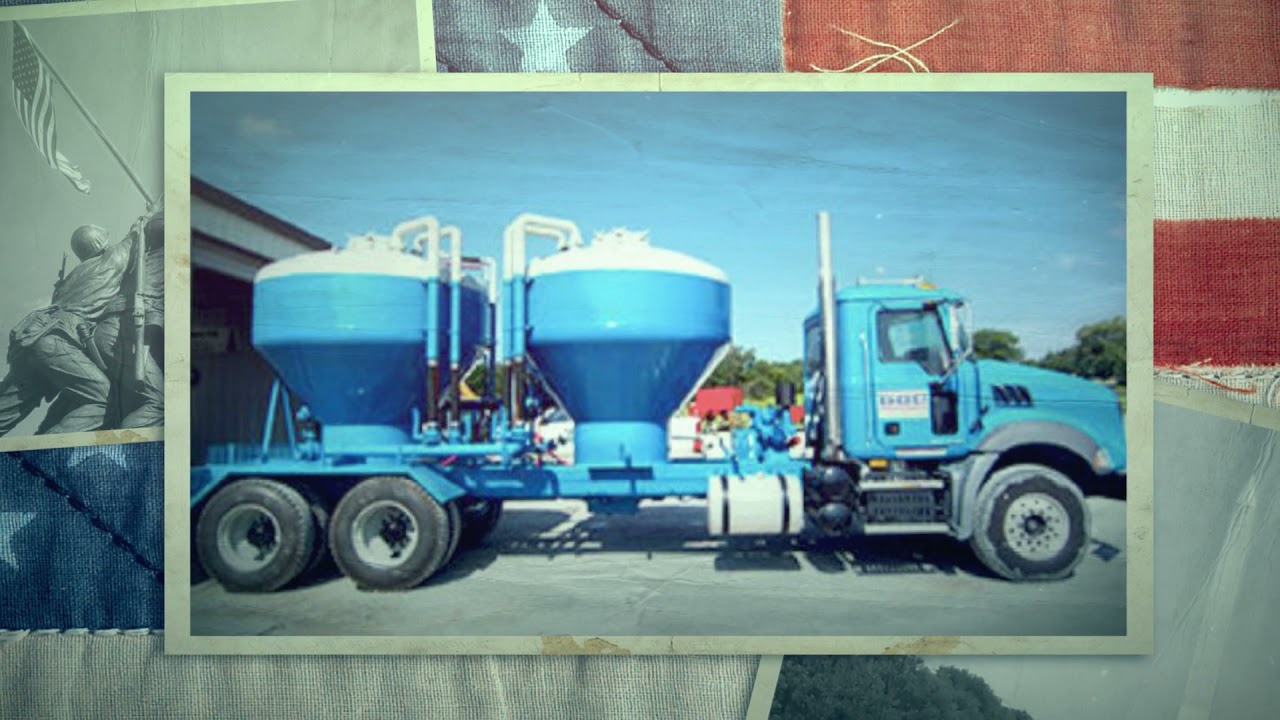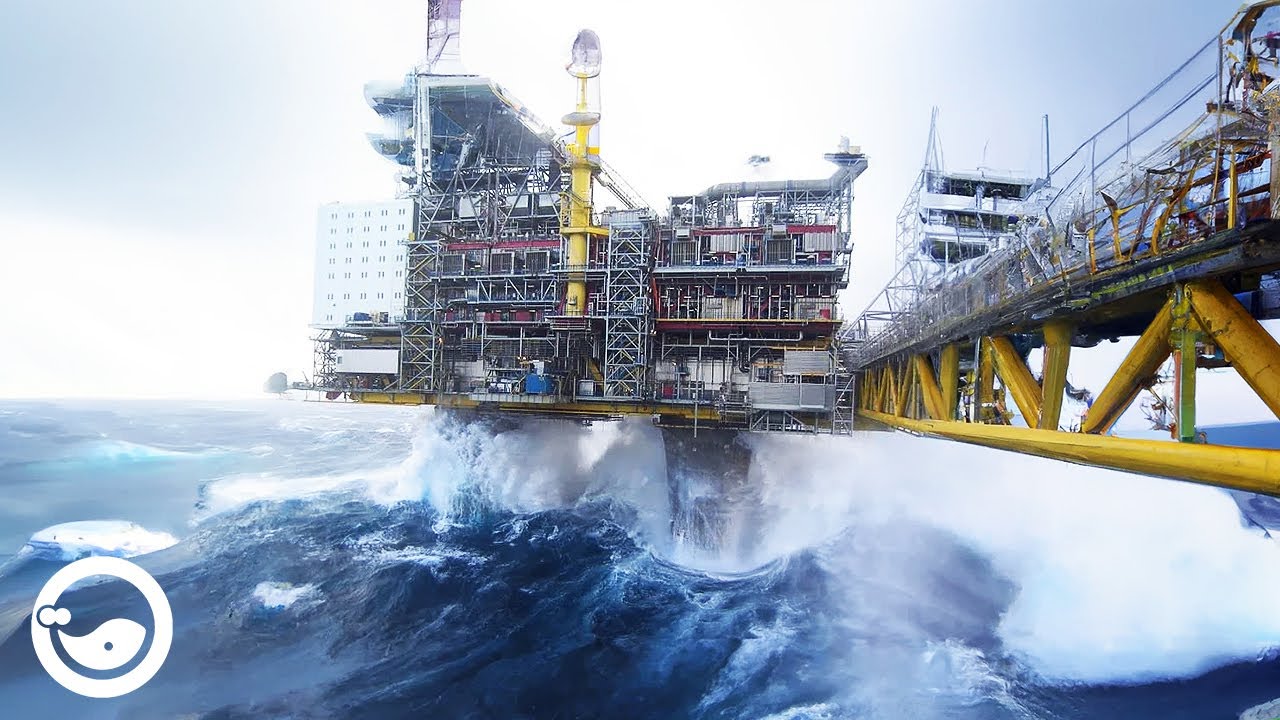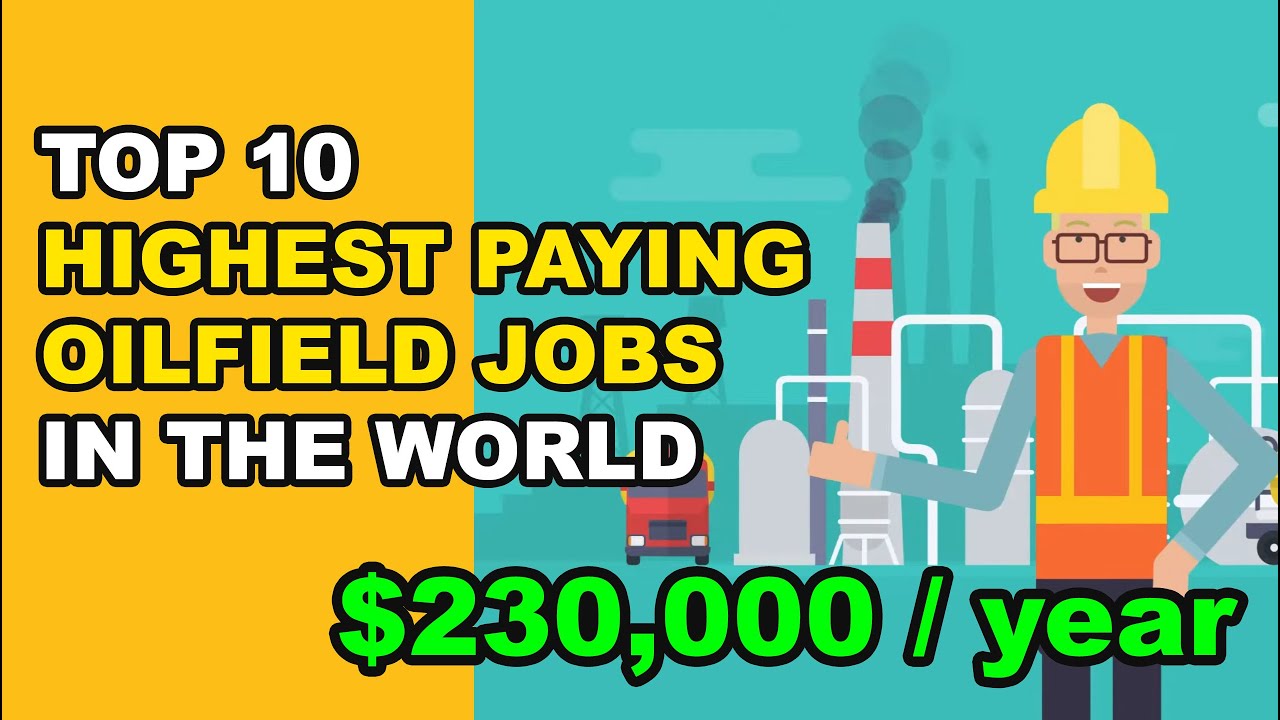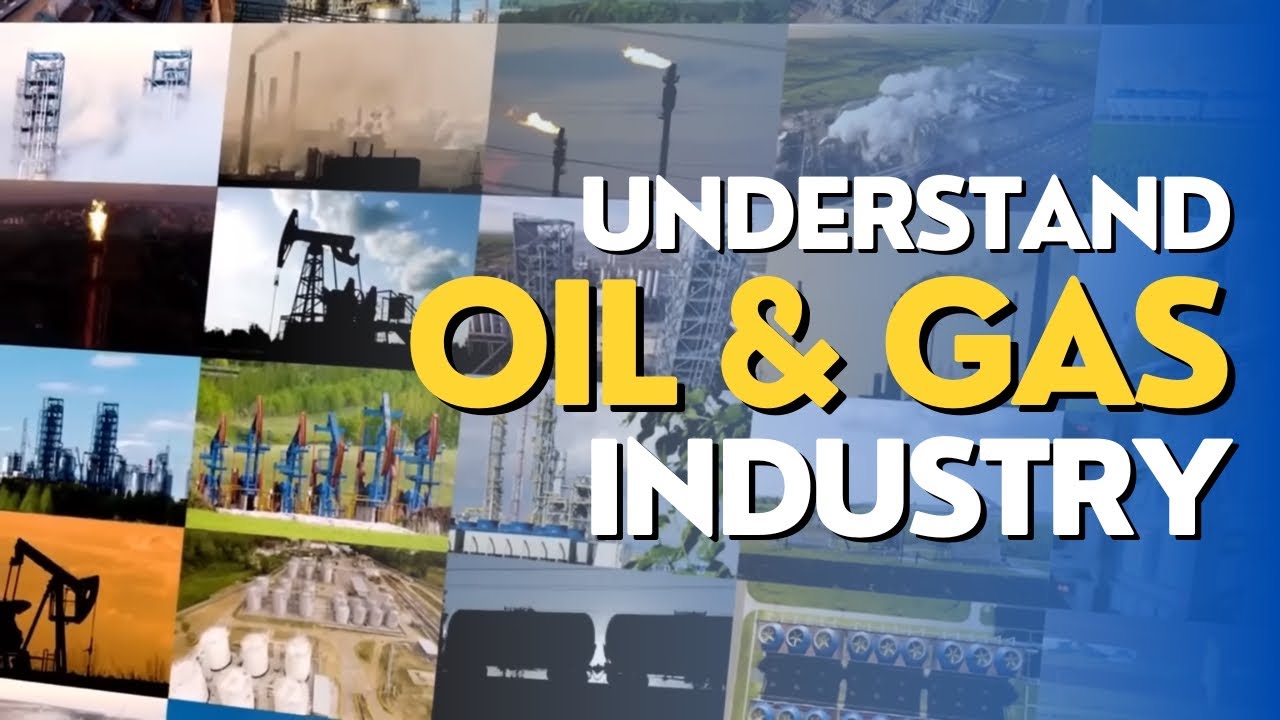Choosing a careerpath is a significant decision that can shape one's professional trajectory and personal fulfillment. When considering various options, the oilfield services/equipment sector stands out as a compelling choice.
In this article, we will explore whether is oilfield services/equipment a good career path. This industry plays a crucial role in fueling the global economy and offers unique opportunities for individuals seeking a challenging and financially rewarding career.
What Are Oilfield Services And Equipment?

Introduction to Oilfield & Drilling Operations and Equipment
Oilfield services and equipment are crucial components of the oil and gas industry. They encompass a wide range of activities, technologies, and machinery that support exploration, drilling, production, and maintenance operations in oilfields. Here's a breakdown of oilfield services and equipment:
Oilfield Services
- Exploration Services- These services involve geophysical surveys, seismic data acquisition and interpretation, and geological analysis to identify potential oil and gas reserves.
- Drilling Services- These services include drilling rigs, drilling crews, and associated technologies to drill wells into the earth's subsurface to extract oil and gas resources.
- Well Services- This includes activities such as well completion, stimulation, and intervention, which optimize well productivity and enhance hydrocarbon recovery.
- Production Services- These services involve equipment and technologies to extract, separate, and process oil, gas, and other fluids from the well and transport them to the surface for further processing.
- Maintenance and Repair Services- These services encompass the upkeep, inspection, repair, and maintenance of oilfield equipment, pipelines, and facilities to ensure safe and efficient operations.
- Environmental and Regulatory Compliance Services - These services focus on environmental monitoring, compliance with regulations, and managing the impact of oil and gas operations on the environment.
Oilfield Equipment
- Drilling Equipment- This includes drilling rigs, drill bits, mud pumps, blowout preventers, and other equipment used in the drilling process.
- Production Equipment- This encompasses wellhead equipment, pumps, separators, compressors, and pipelines used to extract, separate, and transport oil and gas from the reservoir to processing facilities.
- Safety Equipment- This includes personal protective equipment (PPE), fire and gas detection systems, safety valves, and emergency response equipment to ensure the safety of personnel and prevent accidents.
- Measurement and Control Systems- These systems include sensors, gauges, meters, and control panels used to monitor and regulate various parameters during exploration, drilling, and production operations.
- Support Equipment- This comprises a range of auxiliary equipment, such as generators, pumps, cranes, and vehicles, necessary for logistics, maintenance, and overall operational support in the oilfield.
Oilfield services and equipment are essential for the efficient and safe extraction of oil and gas resources, contributing to the functioning of the oil and gas industry as a whole.
Is Oilfield Services/Equipment A Good Career Path?

Is Oilfield Services and Equipment A Good Career Path?
Yes, pursuing a career in oilfield services/equipment can be a good path for several reasons:
- Job Stability and Demand -The oil and gas industry has a consistent demand for skilled professionals in oilfield services/equipment. As long as the world relies on fossil fuels for energy, there will be a need for these services. This sustained demand ensures a stable job market for individuals in this field.
- Lucrative Salary and Benefits -The oilfield services/equipment industry offers highly competitive salaries and benefits packages. Due to the technical expertise required and the often challenging working conditions, professionals in this field are well-compensated. Engineers, technicians, and other skilled workers can earn significant incomes, making it an attractive career choice for those seeking financial stability and security.
- Technological Advancements and Innovation -The oilfield services/equipment sector has witnessed significant technological advancements and innovations in recent years. The industry continually invests in research and development to improve efficiency, safety, and environmental sustainability. Professionals working in this field have the opportunity to work with cutting-edge technologies and gain valuable experience that can enhance their career prospects.
- Global Opportunities -Oilfield services/equipment careers offer global opportunities for those willing to travel and work in different locations. As oil and gas reserves are found across the globe, professionals can explore diverse environments and cultures. Working internationally can broaden one's professional network, provide exposure to different work environments, and contribute to personal growth and development.
- Career Progression and Skill Development -The oilfield services/equipment sector provides ample opportunities for career progression and skill development. With the industry's dynamic nature, professionals can climb the career ladder quickly by demonstrating their expertise and taking on challenging projects. Many companies offer training programs and opportunities for further education and certifications, allowing individuals to expand their skill sets and stay updated with the latest industry trends.
While there may be challenges associated with the industry, such as physically demanding tasks and market fluctuations, the benefits and opportunities available in oilfield services/equipment make it a potentially rewarding career path for individuals with the necessary skills and interests.
Examples Of Oilfield Equipment/Services

Oilfield Equipment Services Overview
Oilfield Equipment
- Drilling Rigs - These are large structures used to drill wells into the ground. They consist of various components such as a derrick, draw works, drill pipe, and drilling mud system.
- Pumps -Oilfield pumps, including centrifugal pumps and reciprocating pumps, are used for various purposes, such as circulating drilling mud, transferring fluids, and enhancing production.
- Wellhead Equipment -This equipment is installed at the top of a well to control the flow of oil or gas and provide a connection point for production equipment. It includes components like the casing head, tubing head, and Christmas tree.
- Separators -Separators are used to separate oil, gas, and water from a mixture produced from a well. They employ various mechanisms such as gravity, centrifugal force, or filtration to achieve separation.
- Compressors -Compressors are used to increase the pressure of natural gas or other gases for transportation through pipelines or for injection into reservoirs to enhance oil recovery.
Oilfield Services
- Geophysical Surveys -These services involve conducting surveys using seismic techniques to map subsurface structures and identify potential oil and gas reserves.
- Well Logging -Well logging services provide data on subsurface formations, reservoir characteristics, and fluid properties using downhole tools and sensors. This information helps in understanding reservoir conditions and optimizing production.
- Well Stimulation -Stimulation services, such as hydraulic fracturing (fracking), involve injecting fluids and proppants into a well to create or enhance fractures in the reservoir, increasing the flow of oil or gas.
- Pipeline Inspection and Maintenance -Companies provide services to inspect, repair, and maintain oil and gas pipelines to ensure their integrity, minimize leaks, and optimize transportation efficiency.
- Drilling Fluid Services -These services involve the formulation and management of drilling fluids (commonly known as drilling muds) used during the drilling process. They help in lubricating the drill bit, cooling and cleaning the wellbore, and preventing formation damage.
These examples represent just a fraction of the wide range of equipment and services involved in the oilfield industry. The sector encompasses a diverse array of technologies and activities necessary for successful exploration, drilling, production, and maintenance operations.
How Many Job Types Are Available In Oilfield Services/Equipment?

Looking for Oil & Gas Jobs? Understand Oil and Gas Industry │ Jobs and Career Guidance │Must Watch
The oilfield services/equipment industry offers a wide range of job types to accommodate various skill sets and expertise. Here are some examples of job types available in this industry:
- Drilling Engineer -Responsible for planning and supervising drilling operations, including well design, equipment selection, and optimizing drilling performance.
- Field Technician -Performs maintenance, troubleshooting, and repair of oilfield equipment, such as pumps, compressors, and control systems, in the field.
- Geologist -Studies subsurface formations, analyzes geological data, and assists in identifying potential oil and gas reservoirs.
- Production Operator -Operates and monitors production equipment, including pumps, separators, and compressors, to extract and process oil and gas from the well.
- Wireline Operator -Conducts wireline logging operations, which involve lowering instruments into the well to collect data on reservoir properties, pressure, and fluid composition.
- Safety Specialist -Ensures compliance with safety regulations and develops and implements safety programs to protect workers and minimize risks in oilfield operations.
- Fluids Engineer -Designs and manages drilling fluid systems, ensuring the proper composition and properties of drilling muds to optimize drilling performance and wellbore stability.
- Project Manager -Oversees and manages oilfield projects, including coordinating resources, budgeting, scheduling, and ensuring project objectives are met.
- Inspection Technician -Conducts inspections and tests on oilfield equipment, pipelines, and facilities to ensure compliance with industry standards and regulations.
- Environmental Specialist -Monitors and manages environmental aspects of oilfield operations, including compliance with environmental regulations, waste management, and mitigation of environmental impacts.
These are just a few examples, and there are numerous other job types available within the oilfield services/equipment industry. The sector requires a diverse range of professionals with technical, engineering, managerial, and specialized skills to support the exploration, drilling, production, and maintenance of oil and gas resources.
Why Choose A Career In Oilfield Services/Equipment?
- Challenging and Dynamic Work Environment -Working in oilfield services/equipment offers an exciting and ever-evolving work environment. The industry presents unique challenges and opportunities that require problem-solving skills and adaptability. No two days are the same, making it a stimulating career choice.
- Opportunity for Travel and International Exposure -Oilfield services/equipment careers often involve travel and the possibility of working in different locations around the world. This provides the chance to explore diverse environments, experience different cultures, and gain a global perspective.
- Teamwork and Collaboration -The nature of the industry fosters teamwork and collaboration. Working on oil rigs, drilling sites, or production facilities requires close coordination and cooperation with colleagues. Building strong working relationships and being part of a team can be fulfilling and contribute to personal and professional growth.
- Contributing to Energy Security - The oil and gas industry plays a critical role in global energy security. By working in oilfield services/equipment, individuals contribute to the reliable extraction and production of oil and gas, ensuring a stable energy supply for various sectors and communities.
- Transferable Skills -The skills developed in oilfield services/equipment are often transferable to other industries. For example, the ability to work under pressure, problem-solving skills, technical expertise, and strong teamwork are valuable assets that can be applied to other engineering, technical, or project management roles.
- Opportunity for Entrepreneurship and Innovation -The oilfield services/equipment industry provides avenues for entrepreneurship and innovation. Individuals with a creative mindset can explore opportunities to develop and introduce new technologies, processes, or services that improve efficiency, safety, and sustainability within the industry.
What Do People Working In Oilfield Services/Equipment Do?

Life & work in Extreme Conditions: This is Why Offshore Oil Rig Workers Earn So much Money
People working in oilfield services/equipment are responsible for various tasks and roles related to supporting oil and gas exploration, drilling, production, and maintenance operations. Here are some examples of what individuals in this field do:
- Drilling Operations -Professionals in oilfield services/equipment may work on drilling rigs and be involved in drilling operations. They assist in setting up drilling equipment, operating drilling machinery, and monitoring drilling progress. They ensure that drilling activities follow safety protocols and optimize drilling efficiency.
- Maintenance and Repair -Workers in this field are responsible for maintaining and repairing oilfield equipment. They perform routine inspections, troubleshoot issues, and carry out necessary repairs to ensure equipment operates safely and efficiently. This can include repairing pumps, compressors, valves, and other machinery.
- Well Services -Individuals in well services roles are involved in activities such as well completion, stimulation, and intervention. They may assist in the installation and maintenance of downhole tools, conduct well tests, and oversee well intervention operations to optimize well performance.
- Equipment Operation -Oilfield services/equipment professionals operate and monitor various equipment used in the production and processing of oil and gas. This includes pumps, separators, compressors, and control systems. They ensure the smooth operation of equipment, monitor performance, and troubleshoot any issues that may arise.
- Safety and Environmental Compliance -Safety and environmental specialists in the oilfield services/equipment sector focus on maintaining safety standards and ensuring compliance with environmental regulations. They develop safety protocols, conduct risk assessments, and implement measures to mitigate hazards. They also monitor and manage environmental aspects related to oilfield operations.
- Technical Support and Engineering -Some individuals provide technical support and engineering expertise in oilfield services/equipment. They analyze data, develop technical solutions, and provide guidance to optimize operations. They may be involved in designing equipment, developing drilling plans, or implementing new technologies to improve efficiency and safety.
- Logistics and Supply Chain Management -Professionals in this field manage logistics and supply chain operations related to oilfield services/equipment. They coordinate the transportation of equipment, ensure timely delivery of supplies, and oversee inventory management to support smooth operations.
Best-Paying Jobs In Oilfield Services/Equipment

Top 10 Highest Paying Oilfield and Oil & Gas Jobs in the World
The oilfield services/equipment industry offers various well-paying jobs due to the technical expertise and demanding nature of the work. Here are some of the best-paying jobs within this industry:
- Petroleum Engineer -Petroleum engineers are responsible for designing and overseeing the extraction of oil and gas from reservoirs. They analyze reservoir data, develop drilling and production plans, and optimize production techniques. Petroleum engineers typically earn high salaries due to their specialized knowledge and critical role in maximizing oil and gas recovery.
- Drilling Engineer -Drilling engineers plan and supervise drilling operations, ensuring efficient and safe drilling practices. They select drilling equipment, design drilling programs, and optimize drilling processes. Their expertise in managing drilling operations makes them highly valued in the industry.
- Completion Engineer -Completion engineers focus on the final stages of well construction and preparation for production. They design and oversee the installation of complete systems, including wellheads, tubing, and production equipment. Completion engineers ensure the successful transition from drilling to production, and their expertise is essential for well productivity.
- Health, Safety, and Environment (HSE) Manager -HSE managers play a critical role in ensuring the safety and environmental compliance of oilfield operations. They develop and implement safety programs, conduct risk assessments, and oversee environmental management practices. Their responsibility for safeguarding personnel and minimizing environmental impact makes their role highly valued.
- Geoscientist -Geoscientists study the Earth's subsurface to identify potential oil and gas reserves. They analyze geological data, interpret seismic surveys, and assess reservoir properties. Geoscientists contribute to critical decisions in exploration and development activities, making their expertise highly sought after.
- Offshore Installation Manager (OIM) -OIMs are responsible for managing offshore oil and gas platforms or drilling rigs. They oversee operations, manage personnel, and ensure compliance with safety and operational protocols. OIMs typically earn high salaries due to the level of responsibility and expertise required for offshore operations.
Entry-Level Jobs In Oilfield Services/Equipment
Entry-level jobs in oilfield services/equipment provide a pathway for individuals to enter the industry and gain practical experience. While specific job titles and responsibilities may vary, here are some common entry-level positions in this field:
- Field Technician/Assistant -Field technicians or assistants support various operations in the field. They work under the guidance of experienced professionals and assist with tasks such as equipment maintenance, basic repairs, data collection, and inventory management.
- Roustabout -Roustabouts are general laborers who perform manual tasks on drilling rigs or production platforms. They assist in assembling and disassembling equipment, handling materials, maintaining cleanliness, and providing support to the drilling or production crew.
- Wireline Operator Assistant -Wireline operator assistants assist in wireline logging operations. They help with the preparation and rig-up of wireline equipment, assist in data collection, handle tools and instruments, and support the logging team under the supervision of senior operators.
- Drilling Fluids Technician -Drilling fluids technicians, also known as mud technicians, work with drilling fluids (mud) to support drilling operations. They assist in the preparation, mixing, and testing of drilling mud, monitor mud properties, and ensure its proper circulation during drilling activities.
- Junior Geologist/Geophysicist -Junior geologists or geophysicists work under the guidance of experienced professionals to collect and analyze geological or geophysical data. They assist in conducting surveys, logging information, creating reports, and supporting data interpretation.
- Safety Technician -Safety technicians provide assistance in maintaining safety protocols and procedures. They participate in safety inspections, conduct equipment checks, assist in incident investigations, and promote safe working practices under the guidance of safety managers or supervisors.
Education And Certification Requirements For A Career In Oilfield Services/Equipment

Oil & Gas Jobs and Career Guide Course from The Institute for Oil & Gas Sector
A career in oilfield services/equipment typically requires a combination of education and certifications. The specific requirements can vary depending on the job role and company, but here are some general guidelines:
Education Requirements
- High School Diploma or Equivalent -Most entry-level positions in the oilfield services/equipment industry require a high school diploma or equivalent. This provides a foundation for further education or training.
- Technical or Vocational Training -Pursuing technical or vocational training programs related to oilfield services/equipment can be beneficial. These programs offer specialized knowledge and practical skills that are directly applicable to the industry. Examples include programs in engineering technology, petroleum technology, welding, electronics, or instrumentation.
- Associate's Degree or Bachelor's Degree -For certain roles, such as engineering or geology positions, an associate's degree or bachelor's degree in a relevant field is typically required. Degrees in engineering, geology, geophysics, or related disciplines can provide a strong educational foundation for these roles.
Certification Requirements
- Industry-Specific Certifications -The oilfield services/equipment industry often requires specific certifications related to the job role. Examples include certifications in well control (such as IWCF or IADC Well Control), safety certifications (such as H2S awareness or Basic Offshore Safety Induction and Emergency Training - BOSIET), or specialized equipment operation certifications (such as forklift operation, crane operation, or wireline operations).
- Professional Engineering Licensure -For engineering roles, obtaining a professional engineering license is often desirable. This typically requires an engineering degree from an accredited institution, relevant work experience, and passing a licensure examination.
- Health and Safety Certifications -Safety is a critical aspect of the oilfield industry. Obtaining certifications such as Occupational Safety and Health Administration (OSHA) certifications or specialized safety certifications (such as Certified Safety Professional - CSP) can enhance job prospects and demonstrate knowledge of safety practices.
People Also Ask
What Are The Job Prospects Like In The Oilfield Services/Equipment Industry?
The job prospects in the oilfield services/equipment industry can be favorable. As long as the demand for oil and gas persists, there will be a need for skilled professionals in this field. However, it is worth noting that the industry can be cyclical, and market fluctuations can impact job stability.
What Are The Typical Working Conditions In Oilfield Services/Equipment Careers?
Oilfield services/equipment careers often involve physically demanding work in various environments, including offshore rigs, remote locations, and extreme weather conditions. Long hours and irregular schedules are common in this industry. Safety protocols and equipment are crucial to mitigate risks associated with the work environment.
What Skills Are Important For Success In Oilfield Services/Equipment Careers?
Several skills are valuable in oilfield services/equipment careers. Strong technical skills, problem-solving abilities, teamwork and communication skills, adaptability, and a strong focus on safety are essential. Additionally, being able to work under pressure and handle challenging situations is advantageous in this industry.
Are There Opportunities For Career Growth And Advancement In Oilfield Services/Equipment?
Yes, there are opportunities for career growth and advancement in oilfield services/equipment. With the industry's dynamic nature, professionals who demonstrate their expertise, take on challenging projects, and pursue continuous learning and development can progress quickly. Many companies offer training programs and pathways for career advancement within their organizations.
Conclusion
A career in oilfield services/equipment can be an excellent choice for those seeking a rewarding and dynamic profession. The industry provides job stability, attractive salaries, and benefits packages, making it financially appealing. While there are challenges associated with the industry, such as physical demands and market fluctuations, these can be managed with proper precautions and adaptability. The oilfield services/equipment field offers a promising future for professionals looking for a stimulating and lucrative career path in a globally essential industry.